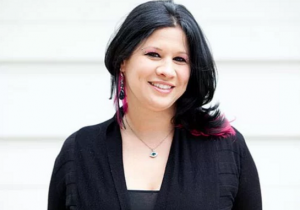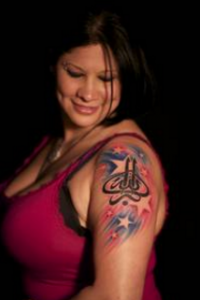
Shadia Amen
Today’s younger Arab-American generation have a unique way of displaying their cultural identities. Shadia Amen is a young Arab woman of Lebanese heritage from Dearborn, who has nearly half of her body covered in artistic tattoo designs which she has chosen for herself.
Her back bears the image of an angel, and a beautiful candle-holding cedar tree is visible on her forearm. Amen sees her body as a canvas. One on which she can permanently display special memories and honor her loved ones. Some of her tattoos are daily reminders of the lessons she has learned throughout her lifetime. But, although the art of tattoos is condemned in Middle Eastern cultures and Islam, they are important to her.
The largest tattoo on her body is on her back, and Amen says that it represents a stage of her life which she has left behind. The tattoo of a fallen angel looking over her shoulder was specifically placed on her back and is a reflection of some of the darker moments in her life.
The cedar tree on her forearm has red roots to illustrate the lives which were lost during the war, those who died for their country. The branches of the tree hold two candles to signify Lebanon’s resilience, and three small human figures stand behind the cedar tree in a representation of “the diverse community striving to coexist.” All these intricate details on the tattoo image bear the resemblance to something important to her.

Amen showing off one of her tattoos
Amen also has a tattoo of three small, green, yellow, and black birds which represent the lyrics, “Everything’s gonna be all right” from one of Bob Marley’s songs “Three Little Birds”.
Amen says that her parents don’t particularly agree with her having so many tattoos all over her body, but they have spent most of their lives in the United States and have become quite accustomed to the cultural differences. When she visits her grandmother, however, she often wears hoodies and other clothing to cover up her tattoos. Working with children during the day, Amen is often met with looks of disapproval from some but finds that her co-workers and parents of her students are rather accepting towards her.
Amen is just one among many young Arabs whose “flamboyant individuality” may be welcomed by some, but she is still entwined in a “purgatory of values,” where others still expect young women to display modesty and conservatism in their daily lives.
